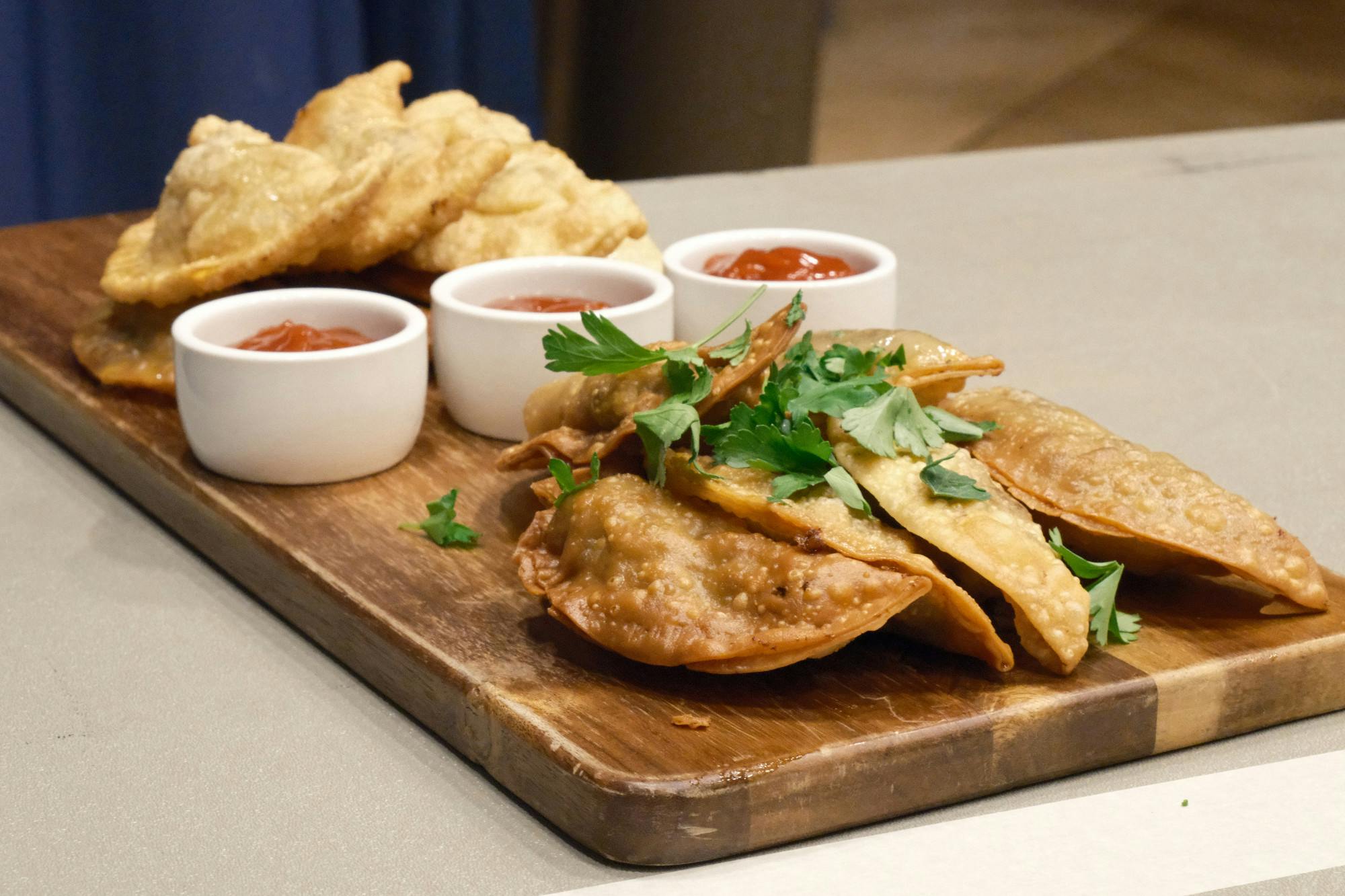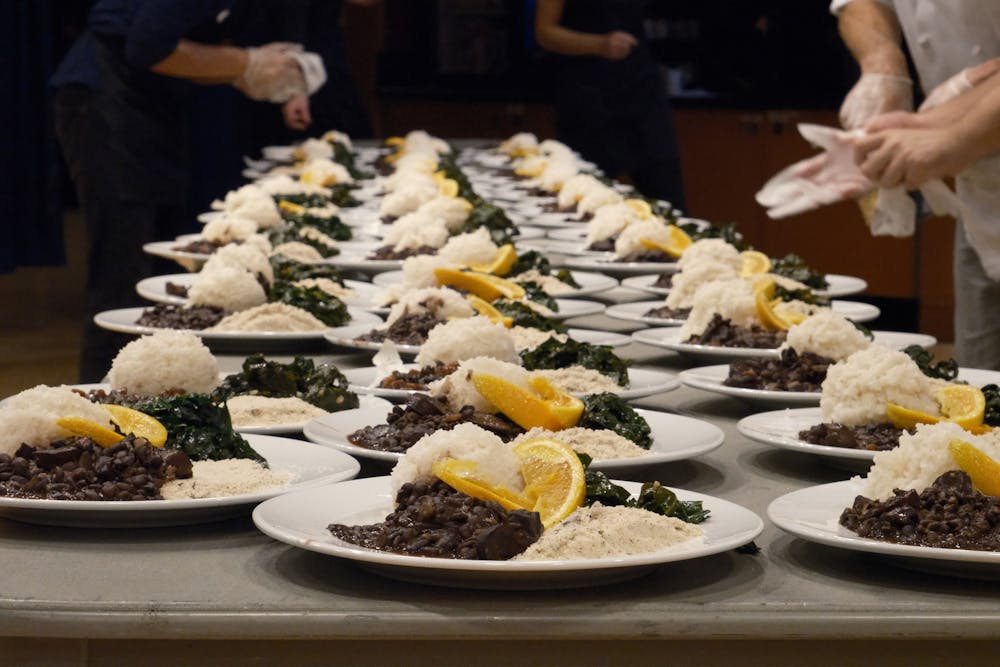Following a successful semester debut in October, Middlebury’s student-run fine dining club, Dolci, made a captivating return to Atwater Dining Hall on Friday, Nov. 10 for its second dinner of the semester.
The meal began with pão de quiejo, small cheesy bread rolls which are traditionally eaten as a side or snack... Guarana, a traditional Brazilian soda (served in maximum authenticity straight from the can) complemented the appetizer. Following the pão de quiejo came empanadas, some with beef and others with guava paste and cheese. The combination highlighted sweet and savory flavors, which were brought together by the empanadas’ crisp and chewy shells. The main course consisted of Brazil’s national dish, feijoada, a black bean and pork stew, served with rice, farofa (toasted manioc flour) and collard greens, making for a hearty combination. Finally, for a sweet end to the night, guests were treated to a three-part dessert consisting of flan, strawberry mousse and a chocolate truffle all served side by side in a three-bowl dish.
While October’s Dolci dinner, “Knolci,” highlighted the Knoll, the college’s on-campus farm, this dinner’s Head Chef Sarah Furtado ’25 took guests on a flavorful, four-course journey 4,000 miles away from Vermont to Brazil in “Dolci Brasileiro.”
Furtado completed Dolci’s Head Chef application last spring, and Dolci board members voted for her leadership at the beginning of the fall out of a pool of about 10 applicants. When asked what drew them to Furtado’s application, Dolci board members Grayson Shanley Barr ’23.5, Elliote Muir ’25.5 and Jaeden Lee ’24 cited Furtado’s enthusiastic proposal and noted the importance of using Dolci as a platform to highlight diverse cuisine.

At the beginning of the fall semester, Furtado began meeting regularly with Lee and Barr to brainstorm a menu. Throughout the process, Furtado, whose parents are from Brazil, tried to channel the flavors of her childhood while also being realistic about which ingredients could be sourced and which recipes could be easily scaled to 120 servings. The final menu ultimately reflected some of Furtado’s favorite Brazilian dishes: pão de queijo (tapioca cheese bread), pastel de carne and pastel romeu e julieta (empanadas stuffed with beef or guava and cheese), feijoada (a meat and bean stew), pudim de leite (flan), danoninho (yogurt mousse) and brigadeiro (chocolate truffle).
Unlike Knolci, which emphasized food relocalization and sourced much of its produce from the Knoll, this dinner incorporated ingredients from far and wide. Furtado explained that in order to source authentic ingredients, the team had to order several foods through online Brazilian foods markets. Doing so allowed the chefs to secure special Brazilian meat, signature Guarana Brazilian soda, guava paste and more.
However, shipping ingredients from across the country and the world did create some “snafus” according to Barr.
“We ordered meat, and it was delivered but no one realized it was meat in the box, so it wasn’t refrigerated. And so we got there on Monday of the week of the dinner and the meat just hadn’t been refrigerated, so we had to order more meat,” Barr said.
One of the ingredients the team ordered, passion fruit, never showed up, forcing them to adapt their dessert at the last minute.
Despite some inevitable small bumps in the road, the Dolci team applauded Furtado’s dedication throughout the process, which ultimately made the dinner go as smoothly, and tastily, as possible. With some slight adjustments and a new order of (fresh) meat, the meal came together in a resounding success.
“It was just really seamless and she worked incredibly hard. We really appreciated that as a Dolci board,” Barr said.
Unlike Knolci, which consisted of mainly family-style recipes, “Dolci Brasileiro’s” dishes were served mainly as single servings. Muir reflected on the importance of plating and portioning and explained that what may seem like an arbitrary choice actually has greater significance in terms of food waste, an impact that was revealed after the dinner.
“I think that family-style is definitely the best way to go for minimizing food waste. For [Furtado’s] dinner we really wanted to follow her lead on her vision for serving and plating. I think we did pretty well on food waste. We weren’t seeing a ton of food coming off the tables,” Muir said. “We’re always kind of thinking about, especially with having multiple courses… ‘how much food should we be giving people on the fourth course when they’re three courses in and starting to get full?’”
While carrying Knolci’s values of food-waste minimization into this dinner, “Dolci Brasileiro” highlighted some different values as well. Many board members, including Lee, Barr and Muir, reflected on the board’s shared interest in providing a platform for diverse cultures, especially in a place like Vermont, which lacks diversity in international cuisine offerings.
“For me personally, it’s very, very important to be able to provide the space for not only the people who come in to cook, but for the people to come in to eat the food as well,” Lee said. “Being in this very rural homogenous place, it’s very difficult to have access to this cultural food, and especially for students that come from the international background or come from a background that’s different than what’s the conventional background in Middlebury. That’s something I value a lot and one of the biggest reasons why I love cooking for Dolci.”
As guests finished their dessert, Furtado, other chefs and the Dolci board lined up in the front of the room to offer their remarks and thanks to Atwater staff. Dolci board member Sophia Giliberto ’24, who spoke at the event, acknowledged the importance of gathering in community around food after what was an especially difficult week for Middlebury.
As Giliberto described, Dolci’s Friday dinner was a potent reminder of the power of food as a source of joy and means of building community, especially in the midst of sorrow. Dolci hopes to continue creating community and joy and giving platforms to diverse cultures in the future.

Maggie Bryan '25 (she/her) is the Senior News Editor.
Maggie is a senior at Middlebury, majoring in Environmental Policy and French. She previously held roles as Senior Arts and Culture Editor, Arts and Culture Editor, and Staff. During her free time, she loves running, listening to live music, drinking coffee, and teaching spin classes. She is from Chapel Hill, North Carolina.




